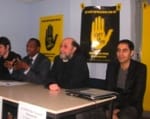In early January, former Minister of Immigration Brice Hortefeux reviewed his term and announced nearly 30,000 expulsions for the year 2008. This figure has been heavily contested by his critics. The association SOS Racism during its latest campaign starting January 21 stated: “30,000 expulsions per year is a disgrace.” Karim Ben Younes, head of events at SOS Racism 06, protests, “within each number there is a man,” which is the primary message of this new campaign.
According to the association, this policy of focusing on numbers is “an infringement on the rights of individuals. It solves none of the problems our country faces.” Guillaume Ayne, General Director of SOS Racism, explains, “with the crisis, tensions are rising. The Board of Directors boasts and blames undocumented immigrants as responsible while they are merely a manifestation of globalization.” He continues, “There is a significant regression of rights. We are entering an arbitrary logic when discussing numbers.”
The Alpes-Maritimes is an exception. Unlike other prefectures, the one in A-M “refuses to give exact figures,” states Amadou Diallo, public relations officer at SOS Racism 06. “Two out of three people who come to us are undocumented. They are afraid to directly approach the administration.”
A campaign in three phases
The campaign will be divided into three distinct stages. During the first semester, “we will be in the phase of raising awareness,” announces Guillaume Ayne. Happenings will be organized in symbolic places to remind everyone that “an expulsion is a life that stops abruptly.” From spring, conferences and debates will spread throughout France and will address various themes in an educational manner to “serenely approach the immigration issue.” They are expected to lead to “about ten proposals.”
For the last phase, the association aims to hold public meetings with the general public and society. To conclude the end of these three stages, the selected proposals will be debated at the General States of French immigration policy in the spring of 2010 in Paris. They will also be presented to public authorities as part of the election process for 2010/2012 to make them a prerequisite for any reform of immigration policy.


